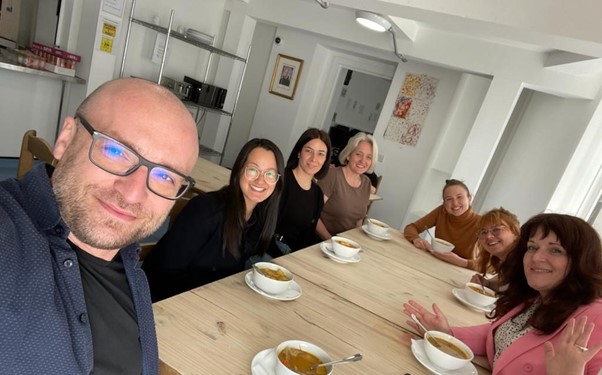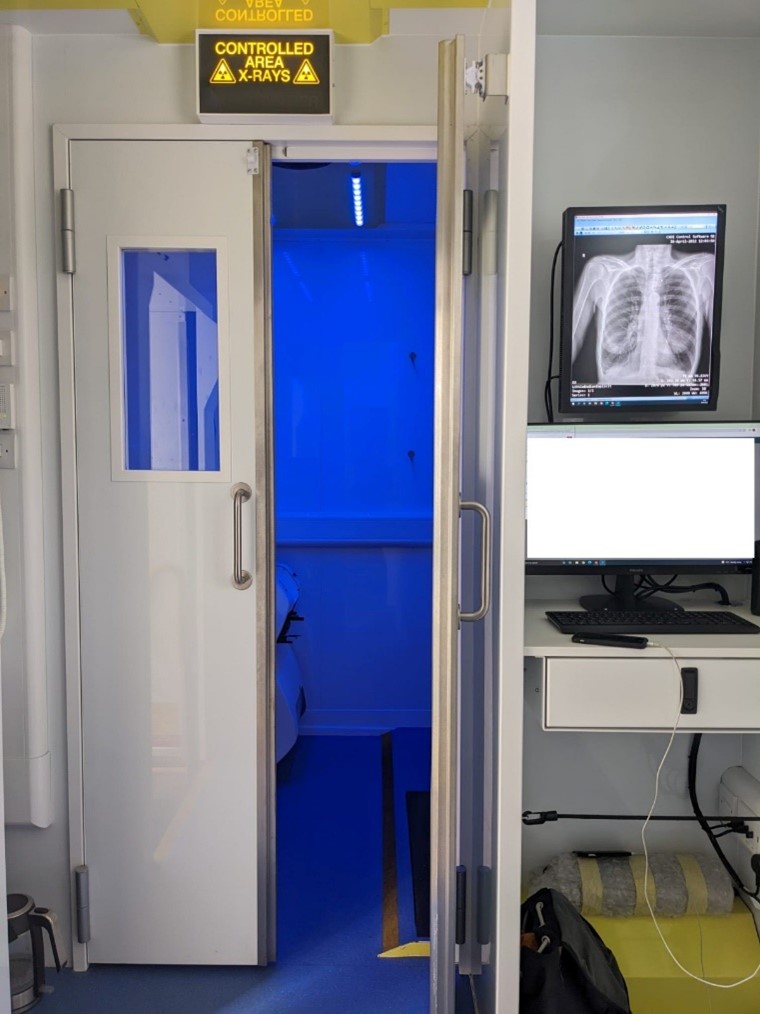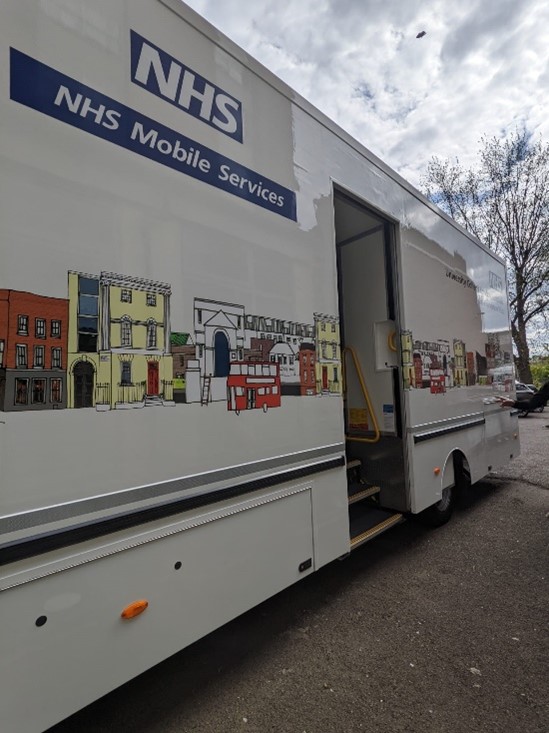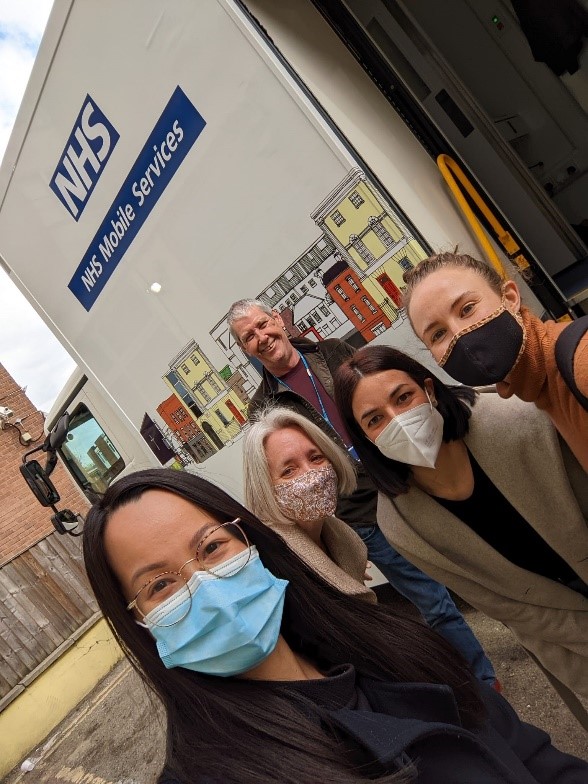Earlier this year, on the Homeless Health (HH) team, we were given the opportunity to visit two award winning health and care services aimed at supporting individuals experiencing homelessness. Here is how we got on and what we learned during the visit.
We spent the morning learning about the incredible support that is offered at Ollalo House and what a day in the life of a resident looks like. In the afternoon, we heard from the UCLH Find & Treat team about their invaluable work screening and treating residents across London. Seeing first-hand the day to day running of this one-stop-shop health service opened our eyes to what makes a service truly accessible and inclusive for people experiencing homelessness.
When the day drew to a close, we all reflected on the phenomenal impact that can be achieved with a huge amount of passion and a thoughtful approach. The two services offer lessons on how to successfully tailor health and care services to the needs of those using them. Key ingredients to the services’ successes included:
- The physical accessibility of their services e.g., ramps, lifts
- The language and cultural accessibility of the service e.g., translators, staff speaking multiple languages, or being from a range of backgrounds and cultures
- Providing a one-stop-shop so users can access multiple services or have multiple needs met at the same time and location
- Open, safe and non-judgmental environment e.g., staff trained in how to approach service user conversations
- Meaningfully involving service users or those with lived experience in the design and delivery of the service
Ollalo House – residential and holistic support for people who are vulnerable and in need
The Ollalo House team in Euston is an intermediate care service which was founded in 2008. The service offers accommodation and holistic wrap-around support to those who are vulnerable and in need. The charity supports individuals with a variety of different health and care issues, including – but not limited to:
- Homeless people who have experienced trauma and face multiple disadvantages
- Migrants facing homelessness
- Victims of human trafficking
- Individuals who have been diagnosed with tuberculosis and are experiencing homelessness
We were warmly welcomed by Pawel the Service Manager of Ollalo House and taken on a tour of the house. Colourful artwork created by residents hung on the walls, offering pops of colour and highlighting residents’ creativity as we walked from reception to bedrooms and communal spaces upstairs.

A delicious lunch in Ollalo House’s dining room, if you look closely, you can see residents’ artwork featured on the wall behind us.
Speaking with Pawel it was clear how all-encompassing the support they offer is. Individuals referred to Ollalo House are given a place to call home, with their own room, bathroom, as well as multiple living rooms and kitchens and a computer room to get online. Residents are given three meals a day, cooked from scratch on site and can also snack on food stored in the kitchen in between meals. Typically, those accessing the service are individuals who would otherwise be homeless or sleeping rough, sorting out their accommodation is one of the first and important steps to beginning their journey to a stable healthy life. Having regular meals and getting the right nutrients also forms part of that important journey.
Each individual is assigned a support worker. The most multi-lingual amongst them speak 12 languages, which Pawel highlighted was important for building relationships with clients and making them feel at ease. Cantonese and Mandarin are the two latest languages that his team can speak, and he plans to expand the team by adding Russian, Ukrainian, and Romanian speakers in the near future.
Support required varies from person to person. For instance, one resident may benefit from help navigating public transport when getting to a new job, others could need help reading documents, another signing up to a GP practice or attending an alcohol detoxification appointment. The support can also include helping residents to set up daily routines, create a healthy structure of friends and family around them, sort referrals to services, or create an action plan for anything from health, to career and finances.
If you would like to know more about the amazing work, visit the Ollalo House website.

Double doors leading to the Find&Treat mobile chest X-ray machine. On the right is the screen where the X ray images are generated and then read by the clinical team.
UCLH Find & Treat Team – bringing health services directly to those in need
The second service we visited was the UCLH Find & Treat service. This ground-breaking service has been working on the streets of London since 2008, offering care for people experiencing homelessness and other vulnerable adults. The team have taken their mobile clinic all over the UK and Ireland, with their two Find and Treat vans. The mobile units visit a wide range of sites including street kitchens, homeless hostels and prisons, or anywhere where marginalised adults who may struggle to access mainstream healthcare live or will frequently visit.
Once set up on site, the service offers screening, diagnosis and treatment for a range of conditions such as tuberculosis, Hepatitis B and C, HIV, cardiovascular diseases, STIs and COVID-19. No appointment is needed, you simply knock on the door of the van for an opportunity to get a comprehensive health check. If any of the above conditions are identified, then the treatment process can also be started. Much of the screening done can be interpreted and the results given on the same day. The appointment is also an opportunity to connect individuals with other health and care services they need but may not have accessed otherwise.
It’s clear from our visit how effective the mobile clinic approach is – bringing health services to individuals, rather than asking those same people to visit a fixed NHS site. The numbers they can reach daily using this approach are impressive. In the two hours while we were there, they screened 37 individuals.

The Find&Treat van with artwork adorning the body of the vehicle – the van is painted with different locations that the team visit regularly, including their home site of UCLH and HMP Pentonville.
Inside the mobile clinics
When you step onboard the larger of the two vans, service users enter a reception area for pre-screening conversations. Once the screening is complete, they walk to the end of the vehicle nearest the driving cabin and enter a room that houses the chest X-ray machine. Once finished with the scan, they step back outside and walk around to the back of the van and up the stairs to a consultation room with further diagnostic equipment, where clinical staff will test for further conditions and also deliver vaccines if needed.
On board the second van, users immediately step into the consultation room where individuals they’re met by a friendly face who asks pre-screening questions for a liver health check. Once complete, they step through a doorway to the back of the van and lie down ready for the liver scan. The liver scanner is one of multiple tests done for patients at this one-stop-show and assesses for instance identifies conditions such as cirrhosis and hepatitis.
One of the secrets to the service’s incredible success is the specialist outreach team members with lived experience of homelessness or health conditions that the service treat. As we ourselves witnessed, these individuals help put people at ease during screenings. We saw this firsthand when a woman hovers at the entrance to the van where X-rays are carried out. Uncertain about whether she wants to step on-board, she holds back and warily observes others stepping forward. George, one of the team, approaches her and begins talking, gently outlining the screening process and explaining the support that is available both on-board and after the van has left for the day. Buoyed by his assurances, she seems calmer and climbs the stairs to begin the Tuberculosis screening happening on board the larger X-Ray bus. It’s clear that the warmth and friendliness of the team help alleviate worries about the process.
An inclusive approach
The Find & Treat service is such an important service for London because it allows vulnerable populations to receive the care they need without discrimination and judgement. Having a warm approachable team member who is focused on encouraging someone to begin their screening and treatment journey is key, talking them through what is involved and making sure they feel safe and comfortable. The Find & Treat Team actively encourage you to step onboard and are keen to help answer questions or calm any concerns.
Thanks to the hard work of the team who are continually highlighting the needs of their patients and advocating for further funding for this overlooked population, the service has grown both in the number of conditions it can screen and treat. As we move through 2022, the team aims to continue the wide range of diagnostic tests available with visits planned across the country and even overseas in Dublin.
Taking Learnings Forward
We would like to thank the amazing generosity and kindness of both Ollalo House and UCLH Find & Treat teams in welcoming us to their services and sharing their experiences of supporting individuals who are experiencing homelessness.
The visits were invaluable for deepening our understanding of just how important these services are. Going forward when we work with health and care commissioners this knowledge will be key and mean we can draw attention to the importance of maintaining and expanding these invaluable services.
Interested in finding out more? Visit the Find&Treat website and Ollalo House website.
For more information, or resources for people experiencing homelessness, see our resources page.here.

